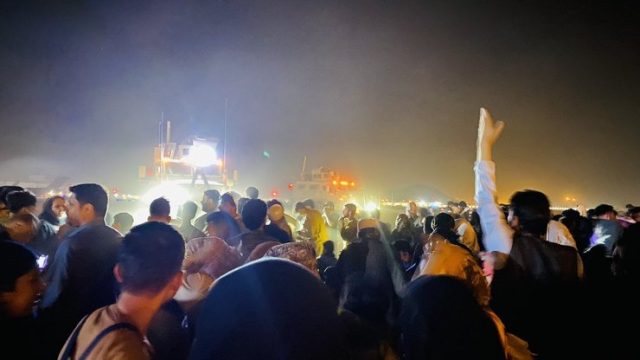On Wednesday evening, February 8, an incident occurred in Kabul that caused sorrowful and shocking scenes at Kabul Airport in the days following the fall of Afghanistan. A rumor had been circulating among people that Turkish airplanes had arrived to take some Afghans to aid those affected by the devastating earthquake in Turkey. Consequently, thousands of people from various parts of Kabul city and its surrounding provinces arrived at the Kabul airport and attempted to enter the airport terminals.
As usual, some analysts from the Ivory Tower (Arg) criticized the people for believing in rumors and news without doing any investigation. These analysts consider themselves to be all–knowing and always have something to say, even without having the necessary theoretical knowledge to analyze the situation. However, a closer look at the situation in Afghanistan can give an understanding of what is happening. These observers who blame people for being easily influenced by rumors do not consider the sociological or psychological factors that may have caused people to be so chaotic that they would believe these stories without thinking.
The story of Shams Tabrizi‘s relationship with Rumi is well–known. When Shams disappeared for the second time, Rumi was eagerly awaiting his return, and rumors about his fate began to spread throughout the city. Some said he was dead or killed, while others made up stories in order to win expensive gifts from Rumi. People in the neighborhood would tell Rumi that the stories were fabricated, but he would reply by saying “I gave presents because the news was wrong. If any were true, I would have put my head in the footsteps of the person who presented me with the good news.” The purpose of this story is to illustrate how the people of Afghanistan are desperate to escape the oppressive rule of the Taliban, and how any rumors or false news can cause them to react hysterically.
For the past eighteen months, the people of Afghanistan have endured immense hardship and distress, similar to what they experienced over the course of decades. Twenty years after the Bonn Agreement, the people had begun to reap the rewards of living in a modern world. However, with the return of the Taliban, all of their progress was destroyed and they were subjected to rulers with a medieval and oppressive mindset, setting the country back centuries. These rulers are unashamed of their opposition to progress and civilization, and are willing to ruin people‘s lives in the name of protecting religion.
The people of Afghanistan have become increasingly interested in migration over the past year and a half. Contrary to some analysts who claim that the people of Afghanistan have an incorrect perception of life in foreign countries, particularly Western countries, they actually have a realistic understanding of it. They have family and friends living in the West who have informed them of the advantages and disadvantages of living there. People cannot be naive in this day and age, as the world has become a global village. Migration is driven by fear and hardship, rather than the pursuit of happiness and comfort. Those living in Taliban–controlled areas have no security or financial protection. The Taliban are constantly introducing new laws and regulations to limit people‘s freedom, invading their privacy, interrogating, insulting, and humiliating them. Women are kept at home and treated like servants, and girls are denied education. The economic crisis is worsening, causing families to struggle. The medieval rulers of Afghanistan have no plans for creating jobs or fostering entrepreneurship. If it were not for the international community providing humanitarian aid, a full–scale humanitarian disaster would have occurred.
Many Taliban supporters have accused those who fled to the Kabul airport of betrayal and disgrace for having a homeland. However, homeland and country are abstract and subjective concepts. A homeland is only a homeland because of the people who inhabit it. When a person is facing oppression in their home, their feelings can change and they may even develop a hatred for their homeland. Ultimately, one does not have to love or respect a country that cannot provide them with a quality life. The Taliban have treated the Afghan population as prisoners of war, so it is understandable that people would want to leave Afghanistan. This does not mean they hate their homeland, but rather that they loathe the Taliban regime.
Incidents that may seem insignificant can often reveal great truths. On 19 December 2022, the large number of people at Kabul Airport showed that the people of Afghanistan were desperate to escape living under an “Islamic Emirate“. People want the government to provide them with welfare, security, and peace of mind, and it does not matter what name the government carries. If the Taliban leaders are wise, they should use these incidents as a guide to change their governing style. People do not trust words, but they will believe in actions. Therefore, a government that does not create an environment to meet the needs of its citizens is illegitimate, regardless of its name or slogans.











